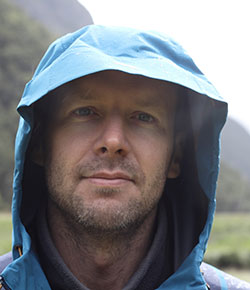
EMCR Forum interview with Adam Roff
Adam Roff PhD
Senior Scientist from the NSW Office of Environment and Heritage
Adjunct Lecturer at the Centre for Ecosystem Science at the University of NSW
Website: http://www.environment.nsw.gov.au/vegetation/vinfo.htm
What is your current occupation or position?
Senior Scientist for the Native Vegetation Mapping Unit, Science Division, NSW Office of Environment and Heritage.
How did you get into the area?
An academic at university posted a National Parks and Wildlife Service job in a common area. I didn’t graduate for another 3 years but I always had that role as a dream job in the back of my head. I decided that if I focused on qualifications that will make me eligible for my dream job I would be in a good position to grab an opportunity when it came along. I was already collaborating with the mapping unit in research when a job came up. By then I was the best qualified and an obvious choice as a candidate.
What do you enjoy most about working in the area?
It is a good mix of things I enjoy and I think variety is important. There is some fieldwork and lots of interactions with ecologists and ecological data. We use lots of high end computers to do feature recognition and image processing which satisfies me as a geek. We are transitioning to a high performance computing environment so our processing is more and more in the cloud and our future delivery will be web based. There are lots of interesting statistical approaches we get to experiment with in R [software for statistical computing and graphics]. Then there is the writing component and getting to interact with some of my heroes in vegetation science. I am also leading a team so it is satisfying to help develop people’s skills and specialties.
What are the most challenging aspects about your job?
On a large project like this, it becomes a challenge to sequence everything. There will be delays in the whole project if any one component isn’t ready when required. Also, we are always trying to innovate better ways to do things but we have to deliver maps as well. There is an inevitable compromise between what you want to deliver and what you can deliver. Finding time to write papers is one the most difficult part of the role.
Describe a typical day in your job?
Part of my day is finding out where everyone is up to and what will be coming next to make sure we are all at capacity. I get to have conversations with my highly skilled team about where we are headed or help problem solving for our latest computer model. Some of my time will be spent coding to generate image products or interpreting survey data and remote sensing data. Some days are all about reading and writing.
Any advice for EMCRs wishing to pursue a career in vegetation mapping?
I value a multidisciplinary approach. I think it is important to develop ecological skills like plant identification and community classification as well as developing modelling skills in R and learning Python. It will never be easier than right now to learn new skills. The best way to learn how to do something is by doing it. You won’t be perfect at it straight away but you learn the most getting things wrong at the beginning. Keep your curiosity.
What excites you about your work?
Coming up with ideas and seeing them through to implementation is really exciting, even if some of them don’t get off the ground. Even if part of my role becomes routine image processing or image interpretation, I can always think of new ways to communicate our work or improve our product. Science is driven by creativity.
How did your PhD or postdoctoral research assist you with a career in environmental science?
The most important thing was being taught how to learn. If I get access to some new data type or modelling approach I know I can find some papers that will describe its use and how to best implement it. Usually, reading up on it will trigger new ideas about how it could fit into our project or how it could be combined with another dataset in unique ways. Having to learn how to do things myself in my honours year was probably the most helpful part of my education.
© 2025 Australian Academy of Science